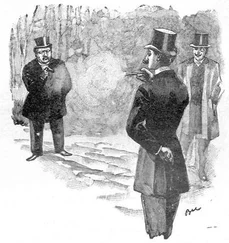He sighed, and kissing her wrists said: "Thanks; I adore you." She took his arm as if he had been her husband, and led him to a couch, upon which they seated themselves side by side. Duroy stammered, incoherently: "You do not care for me."
She laid her hand upon his lips. "Be silent!"
"How I love you!" said he.
She repeated: "Be silent!"
They could hear the servant laying the table in the dining–room. He rose: "I cannot sit so near you. I shall lose my head."
The door opened: "Madame is served!"
He offered her his arm gravely. They lunched without knowing what they were eating. The servant came and went without seeming to notice anything. When the meal was finished, they returned to the drawing–room and resumed their seats on the couch side by side. Gradually he drew nearer her and tried to embrace her.
"Be careful, some one might come in."
He whispered: "When can I see you alone to tell you how I love you?"
She leaned toward him and said softly: "I will pay you a visit one of these days."
He colored. "My rooms—are—are—very modest."
She smiled: "That makes no difference. I shall come to see you and not your rooms."
He urged her to tell him when she would come. She fixed a day in the following week, while he besought her with glowing eyes to hasten the day. She was amused to see him implore so ardently and yielded a day at a time. He repeated: "To–morrow, say—to–morrow." Finally she consented. "Yes, to–morrow at five o'clock."
He drew a deep breath; then they chatted together as calmly as if they had known one another for twenty years. A ring caused them to start; they separated. She murmured: "It is Laurine."
The child entered, paused in surprise, then ran toward Duroy clapping her hands, delighted to see him, and crying: "Ah, 'Bel–Ami!'"
Mme. de Marelle laughed. "Bel–Ami! Laurine has christened you. It is a pretty name. I shall call you Bel–Ami, too!"
He took the child upon his knee. At twenty minutes of three he rose to go to the office; at the half–open door he whispered: "To–morrow, five o'clock." The young woman replied: "Yes," with a smile and disappeared.
After he had finished his journalistic work, he tried to render his apartments more fit to receive his expected visitor. He was well satisfied with the results of his efforts and retired, lulled to rest by the whistling of the trains. Early the next morning he bought a cake and a bottle of Madeira. He spread the collation on his dressing–table which was covered with a napkin. Then he waited. She came at a quarter past five and exclaimed as she entered: "Why, it is nice here. But there were a great many people on the stairs."
He took her in his arms and kissed her hair. An hour and a half later he escorted her to a cab–stand on the Rue de Rome. When she was seated in the cab, he whispered: "Tuesday, at the same hour."
She repeated his words, and as it was night, she kissed him. Then as the cabman started up his horse, she cried: "Adieu, Bel–Ami!" and the old coupe rumbled off.
For three weeks Duroy received Mme. de Marelle every two or three days, sometimes in the morning, sometimes in the evening.
As he was awaiting her one afternoon, a noise on the staircase drew him to his door. A child screamed. A man's angry voice cried: "What is the brat howling about?"
A woman's voice replied: "Nicolas has been tripped up on the landing–place by the journalist's sweetheart."
Duroy retreated, for he heard the rustling of skirts. Soon there was a knock at his door, which he opened, and Mme. de Marelle rushed in, crying: "Did you hear?" Georges feigned ignorance of the matter.
"No; what?"
"How they insulted me?"
"Who?"
"Those miserable people below."
"Why, no; what is it? Tell me."
She sobbed and could not speak. He was forced to place her upon his bed and to lay a damp cloth upon her temples. When she grew calmer, anger succeeded her agitation. She wanted Duroy to go downstairs at once, to fight them, to kill them.
He replied: "They are working–people. Just think, it would be necessary to go to court where you would be recognized; one must not compromise oneself with such people."
She said: "What shall we do? I cannot come here again."
He replied: "That is very simple. I will move."
She murmured: "Yes, but that will take some time."
Suddenly she said: "Listen to me, I have found a means; do not worry about it. I will send you a 'little blue' to–morrow morning." She called a telegram a "little blue."
She smiled with delight at her plans, which she would not reveal. She was, however, very much affected as she descended the staircase and leaned with all her strength upon her lover's arm. They met no one.
He was still in bed the following morning when the promised telegram was handed him. Duroy opened it and read:
"Come at five o'clock to Rue de Constantinople, No. 127. Ask for the room rented by Mme. Duroy. CLO."
At five o'clock precisely he entered a large furnished house and asked the janitor: "Has Mme. Duroy hired a room here?"
"Yes, sir."
"Will you show me to it, if you please?"
The man, accustomed no doubt to situations in which it was necessary to be prudent, looked him straight in the eyes; then selecting a key, he asked: "Are you M. Duroy?"
"Certainly."
He opened a small suite, comprising two rooms on the ground floor.
Duroy thought uneasily: "This will cost a fortune. I shall have to run into debt. She has done a very foolish thing."
The door opened and Clotilde rushed in. She was enchanted. "Is it not fine? There are no stairs to climb; it is on the ground floor! One could come and go through the window without the porter seeing one."
He embraced her nervously, not daring to ask the question that hovered upon his lips. She had placed a large package on the stand in the center of the room. Opening it she took out a tablet of soap, a bottle of Lubin's extract, a sponge, a box of hairpins, a button–hook, and curling–tongs. Then she amused herself by finding places in which to put them.
She talked incessantly as she opened the drawers: "I must bring some linen in order to have a change. We shall each have a key, besides the one at the lodge, in case we should forget ours. I rented the apartments for three months—in your name, of course, for I could not give mine."
Then he asked: "Will you tell me when to pay?"
She replied simply: "It is paid, my dear."
He made a pretense of being angry: "I cannot permit that."
She laid her hand upon his shoulder and said in a supplicatory tone: "Georges, it will give me pleasure to have the nest mine. Say that you do not care, dear Georges," and he yielded. When she had left him, he murmured: "She is kind–hearted, anyway."
Several days later he received a telegram which read:
"My husband is coming home this evening. We shall therefore not meet for a week. What a bore, my dearest!"
"YOUR CLO."
Duroy was startled; he had not realized the fact that Mme. de Marelle was married. He impatiently awaited her husband's departure. One morning he received the following telegram:
"Five o'clock.—CLO."
When they met, she rushed into his arms, kissed him passionately, and asked: "After a while will you take me to dine?"
"Certainly, my darling, wherever you wish to go."
"I should like to go to some restaurant frequented by the working–classes."
They repaired to a wine merchant's where meals were also served. Clotilde's entrance caused a sensation on account of the elegance of her dress. They partook of a ragout of mutton and left that place to enter a ball–room in which she pressed more closely to his side. In fifteen minutes her curiosity was satisfied and he conducted her home. Then followed a series of visits to all sorts of places of amusement. Duroy soon began to tire of those expeditions, for he had exhausted all his resources and all means of obtaining money. In addition to that he owed Forestier a hundred francs, Jacques Rival three hundred, and he was hampered with innumerable petty debts ranging from twenty francs to one hundred sous.
Читать дальше











